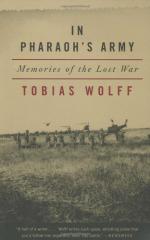|
This section contains 557 words (approx. 2 pages at 400 words per page) |

|
In Pharaoh's Army: Memories of the Lost War Summary & Study Guide Description
In Pharaoh's Army: Memories of the Lost War Summary & Study Guide includes comprehensive information and analysis to help you understand the book. This study guide contains the following sections:
This detailed literature summary also contains Topics for Discussion and a Free Quiz on In Pharaoh's Army: Memories of the Lost War by Tobias Wolff.
"In Pharaoh's Army, Memories of the Lost War," by Tobias Wolff is an autobiographical account of the author's tour of duty in the Vietnam War and the aftermath of his experience as he attempted to adjust to civilian life. The account also describes the contributing factors that led Wolff to decide to serve his country, providing the insight that there are sometimes less than obvious reasons when one makes such a life-changing decision.
The story opens when Wolff and a fellow battalion officer, Sergeant Benet, are risking their lives on an unsafe road to travel to a village where they have arranged to trade a Chinese automatic weapon called a Chicom for a large-screen color television. It is Thanksgiving Day and they are determined to bring some normalcy into their lives. A two-hour Thanksgiving Day special of the western series, "Bonanza," will be airing and they are not going to miss it. They look forward to watching it in color and bringing just a small slice of their former lives into the chaos which has become their new reality.
But the chaos of war was not the first time that Wolff was forced to deal with the challenge of uncertainty in his life. He did not do well in school and his home life was in shatters. He had a supportive mother but his father was a liar and a con man and was serving time in prison when Wolff was in the process of deciding what to do with his life. After having dropped out of high school, Wolff was working as a crew mate on a Coast and Geodetic Survey ship. A night of too much partying caused him to miss his ship's departure. Since he had disappointed his mother too many times in the past, he decided he had to do something to make her proud and prove his worth. Those feelings and the fact that many writers he admired—especially Ernest Hemingway—had served in the military, led him to enlist.
Wolff's leadership skills, intelligence, and abilities were noted by his commanders in recruit training, even though he did not see those same qualities in himself. He was tapped to join Special Forces and attend language school in Washington, DC. He went on to Officer's Candidate School and parachute training and eventually was dispatched as a lieutenant to Vietnam where the war was raging.
Wolff describes his fears and uncertainty as he was thrown into a life-threatening situation which he was not prepared for. Tobias Wolff, who was destined to become a famed author, noted the surrealism of war through the filter of an artist and intellect. In Vietnam, every soldier lived every hour of every day in fear for his life. Those who did not lose their lives were witnesses to the loss of the lives of their fellow soldiers and friends and the other horrors and absurdities that are inherent in war.
After Wolff ends his tour of duty and returns to civilian life, the long tentacles of his experience did not let go so easily. Even years later, after Wolff earned a degree at Oxford, became a famous and successful author and had a family, the horrors of that one year in his life reemerged with little provocation and at the most unexpected times.
Read more from the Study Guide
|
This section contains 557 words (approx. 2 pages at 400 words per page) |

|



